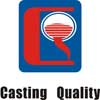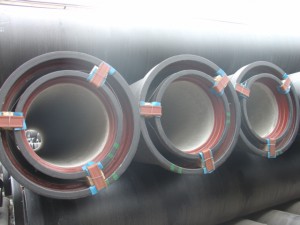Ductile Iron Pipe Features:
1) The pipes are produced with good straightness, wall thickness, remarkable mechanical prosperities and firmly sticking internal and external coating layer
2) Flexible push-in joint and rubber gasket are used resulting in convenient installation of pipelines
3) The pipes are produced by standard ISO2531 and EN 545
4) The pipes are push-in joint type, external coating zinc + bitumen painting, internal lined the cement mortar
5) The gasket materials are the NR, NBR, EPDM, etc.
Ductile iron pipes for water conveyance:
Product standards: BS EN545:2002, ISO2531:1998
1) Pipes are supplied in standard length of 5.5/6.0m, short length pipes as per respective standards can be supplied
2) In addition to Class K9 pipes, We also supplies K7, K8, K10, and K12 classes of pipes
3) The thickness can be determined by the formula-e=K (0.5+0.001DN)
4) PFA (allowable operating pressure) is the internal pressure, exclusive of surge, that a component can safely withstand in permanent service
5) PMA (allowable maximum operating pressure) is the maximum internal pressure, including surge, that a component can withstand for a relatively short duration, when either fixed above ground level or laid and back-filled underground in order to measure the integrity and leak tightness of the pipe.
Ductile iron pipes for sewerage application:
Product standard: BS EN598:2002
Quality checks at every stage of manufacturing:
1) Strict selection of raw material is an indispensable requirement to produce quality ductile iron pipes and fittings.
2) We produces liquid metal suited to manufacture ductile iron pipes. The liquid metal is further processed in induction furnaces. It is then treated with magnesium for modularization and transferred to the centrifugal spun casting machines.
3) The pipes are heat treated, zinc coated, hydrostatically tested, tested, cement mortar lined and finished with a layer of bitumen coating.
4) The in-process inspection and quality control at all points during the production cycle is strictly maintained and documented as ISO9001 quality systems.
Process and testing:
1) Blast furnace (Analysis of raw materials test )
2) Mg treatment (Micro & chemical composition test)
3) Pipe spinning (Temperature test)
4) Heat treatment (Micro structure; Flattening test)
5) Zinc coating (Thickness testing)
6) Dimensional checks (Thickness & Dia. testing)
7) Hydraulic test (Pressure test)
8) Internal lining (Thickness testing)
9) External coating (Thickness test)
Main technical data for ductile iron pipes:
1) Product standard: ISO2531:1998, BS EN 545:2002
2) Class: K9
3) Type of joints: push-in flexible joint







